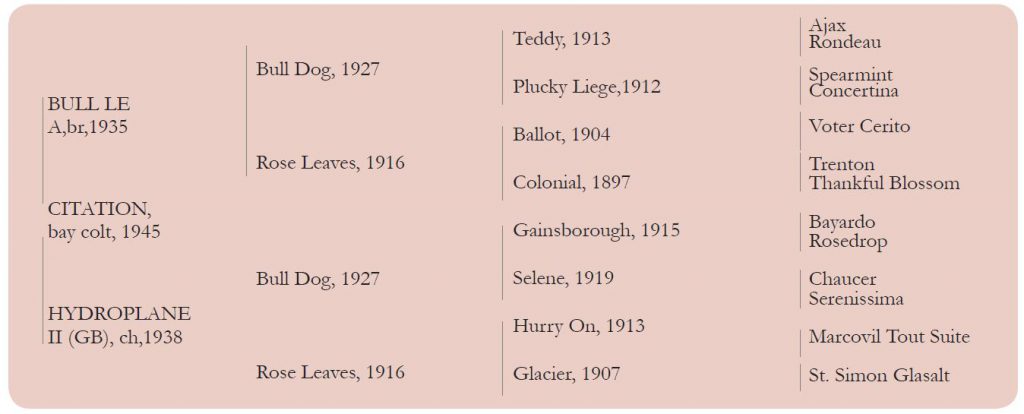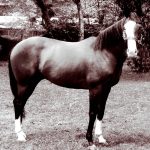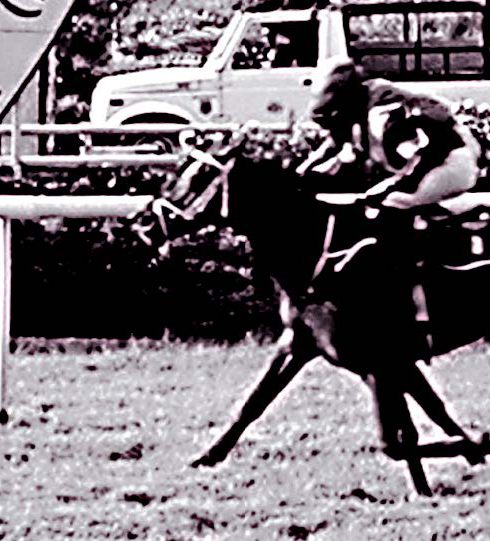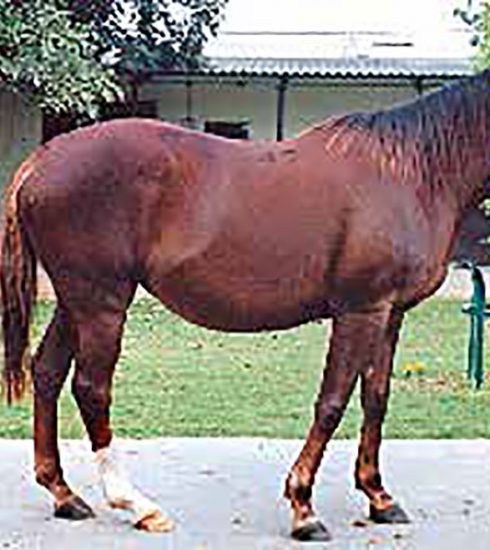CITATION
CITATION
Racing’s First Millionaire

There were few stars in the 1940s to rival Citation and jockey Eddie Arcaro on the nation’s sports pages. Baseball had Joe DiMaggio and Jackie Robinson. Boxing had Joe Louis, and football had Slingin’ Sammy Baugh. The college football ranks were led by West Point stars Glenn Davis and Doc Blanchard. Not one of them, however, could rival the team of Citation and Arcaro going six furlongs or two miles.
[dropcap]C[/dropcap]itation, who was the 1948 Horse of the Year and the last Triple Crown winner for a twenty-fiveyear period, was the brightest star in the galaxy belonging to Warren Wright’s Calumet Farm in the 1940s. Calumet had dominated racing during that decade like no other stable before or since during the 20th Century. Under the management of Hall of Fame trainer Ben A. (Plain Ben) Jones, Calumet captured the money title a record seven years during that ten-year period. Calumet won six Horse of the Year titles with five different horses, all homebreds, and also captured four Kentucky Derbys. Whirlaway, who won the 1941 Triple Crown, captured two of those Horse of the Year titles, but like Calumet Hall of Fame trainer H. A. (Jimmy) Jones pointed out, he was no Citation. Neither was any other horse.“He was the best horse I ever saw,” said Jones, who took over as Citation’s trainer from his father, Ben Jones. “Probably the best anybody else ever saw, I expect. “Citation didn’t have a fault. He could sprint, he could go two miles, he could go in the mud, and go on a hard track. He could do it all.”
Jones recently ranked Citation above 1970s superstar Secretariat, praising that horse, but claiming that “Secretariat couldn’t run a bit in the mud.” Ben Jones went even further. “Man o’ War? Citation is a better horse,” he said.
Citation was a member of the fifth crop of foals sired by Calumet stallion Bull Lea. That crop also included the colt Coaltown, and a daughter, Bewitch, and is looked upon by many veteran pedigree experts as the strongest crop ever to represent an individual stallion. Coaltown, who finished second behind Citation in the 1948 Kentucky Derby, shared Horse of the Year honors with Capot in 1949. Bewitch, who entered into the record books by being the first horse to beat Citation, was the champion two-year-old filly of 1947 and the year’s leading money-earning juvenile among females and males.
Citation was racing’s first millionaire, but he didn’t get to that $1-million mark in a direct route. He raced at ages two and three, missed his four-year-old season after developing osselets, then came back to run at five and six. Citation’s record in his first two years was absolutely extraordinary – twenty-seven wins from twenty-nine starts and those two losses, both runner-up efforts, came under questionable circumstances. His earnings as a three-yearold, during which he won nineteen of twenty races, were a seasonal record $709,470. As a five-year-old in 1950, Citation extended his winning streak to a modern-day record sixteen (a mark equaled in 1996 by Cigar), and the following year he topped the $1-million mark.
Citation’s loss to Bewitch came in the 1947 Washington Park Futurity in his sixth start. The Calumet colt Free America also was in the race, and the outfit set its sights on a one-twothree finish. “We told the riders before the race, we’d split the fees three ways between them, and whoever was in front was to be allowed to win the thing without anybody whipping anything to death,” Jimmy Jones said. “Well, Bewitch got out there. She could go five-eighths in :58 any time, so Citation just sort of went along. Bewitch kind of eased up, though, in the stretch, and Citation picked up five lengths on her. She won by a neck (actually won by a length), Citation finishing a head in front of Free America.
“When the riders came back to us after the race, Doug Dodson, who was on Bewitch, said he could have gone on and pulled away any time he wanted, but Steve Brooks said, ‘Naw, Citation was just loafing.’ About that time Jackie Westrope came back with Free America and said, ‘You guys are just kidding yourself, I coulda taken both of you without even going to the whip.’
Citation went on to win his final three races of the year and was named champion two-yearold male. Sent to Hialeah for the winter, Citation proved to be classic material right from the start. He won all four of his races, including the Seminole Handicap from older stablemate Armed. Armed was 1947 Horse of the Year, and Citation’s triumph seemed to take on the appearance of a changing of the guard in the Calumet ranks.
Citation was ridden in his next start by Arcaro for the first time. Al Snider, who had ridden Citation at Hialeah, had disappeared in Florida and would never be heard from again. In Arcaro’s first ride, Citation finished second to Saggy in the Chesapeake Trial Stakes over a muddy track, but the effort still pleased the eventual Hall of Fame rider. “I could have caught him,” Arcaro said about Saggy, “but I wasn’t about to burn up that horse for an $8,300 pot with all those $100,000 races ahead.” Five days later, Citation beat Saggy in the Chesapeake Stakes, and was on his way to Churchill Downs. Citation won the Derby Trial the week of the Kentucky Derby, but the talk of the town centered on another Calumet Derby contender, Coaltown, who had broken the track record in the Blue Grass Stakes at Keeneland the previous week. Churchill thought so highly of the two Bull Lea colts that it dropped place and show betting.
Citation and Coaltown ran as an entry against four others and finished in that exact order, the winner easing across the finish line in 2:05 2/5 over a sloppy track. Ben Jones was listed as the official Derby-winning trainer, even though his son had been in charge of Citation’s progress leading up to the race. Citation next won the Preakness in the absence of Coaltown, then set a track mark of 2:03 for one and a quarter miles in the Jersey Stakes at Garden State Park. Two weeks later, it was Citation’s chance to become racing’s eighth Triple Crown winner. Seven challenged, but none got closer than eight lengths at the wire. His time of 2:28 1/5 equaled Count Fleet’s stakes record set in 1943. It had been twenty-eight years since Man o’ War’s farewell race in Canada, and here at last might be the great one’s successor.
 “It was Citation, who I have watched grow in stature for almost a year, now, with the slowly crystallizing hope that here, at long last, was the horse we’d been looking for since a great golden chestnut roared to a stop at Kenilworth Park back in 1920,” wrote Joe Palmer for The Blood-Horse. “ I could not see Arcaro move. But with some slight dropping of the hands, he released the swelling energy of the great racer beneath him. Citation opened away. He was three-sixteenths away but he was home.” Citation spent the summer in Chicago before returning to New York for the fall. In a remarkable display of versatility at Belmont Park, he won the Sysonby Mile over First Flight and Coaltown on Sept. 29, then three days later won the twomile Jockey Club Gold Cup over Phalanx. His victory in the Pimplico Special in late October was a walkover. Citation ended his three-year-old season with fifteen consecutive victories. Following a year off, he won an allowance race at Santa Anita in January of 1950 in his first race back to set the modern-day record of sixteen straight. That year also marked a distinct rivalry between Citation and Noor in California. Noor won four stakes between the two, but received a great deal of weight in two of them. Citation surpassed the $1-million mark in taking down the $100,000 winner’s purse in the 1951 Hollywood Gold Cup in July, and was retired soon after. At year’s end, he was cochampion handicap male with Hill Prince.
“It was Citation, who I have watched grow in stature for almost a year, now, with the slowly crystallizing hope that here, at long last, was the horse we’d been looking for since a great golden chestnut roared to a stop at Kenilworth Park back in 1920,” wrote Joe Palmer for The Blood-Horse. “ I could not see Arcaro move. But with some slight dropping of the hands, he released the swelling energy of the great racer beneath him. Citation opened away. He was three-sixteenths away but he was home.” Citation spent the summer in Chicago before returning to New York for the fall. In a remarkable display of versatility at Belmont Park, he won the Sysonby Mile over First Flight and Coaltown on Sept. 29, then three days later won the twomile Jockey Club Gold Cup over Phalanx. His victory in the Pimplico Special in late October was a walkover. Citation ended his three-year-old season with fifteen consecutive victories. Following a year off, he won an allowance race at Santa Anita in January of 1950 in his first race back to set the modern-day record of sixteen straight. That year also marked a distinct rivalry between Citation and Noor in California. Noor won four stakes between the two, but received a great deal of weight in two of them. Citation surpassed the $1-million mark in taking down the $100,000 winner’s purse in the 1951 Hollywood Gold Cup in July, and was retired soon after. At year’s end, he was cochampion handicap male with Hill Prince.

Citation entered stud at Calumet in 1952, which at that time was owned by Mrs. Wright. Warren Wright had died before seeing Citation become racing’s first millionaire.
 Like many of the turf ’s greatest horses, Citation failed to sire a horse of equal caliber, although he did get two good ones. His daughter Silver Spoon is a member of the Racing Hall of Fame, and son Fabius won the 1956 Preakness. Citation also was the sire of the dams of thirty-three stakes winners. Citation was elected to the Racing Hall of Fame in 1959, and died at age twenty-five on Aug. 8, 1970.
Like many of the turf ’s greatest horses, Citation failed to sire a horse of equal caliber, although he did get two good ones. His daughter Silver Spoon is a member of the Racing Hall of Fame, and son Fabius won the 1956 Preakness. Citation also was the sire of the dams of thirty-three stakes winners. Citation was elected to the Racing Hall of Fame in 1959, and died at age twenty-five on Aug. 8, 1970.

Extract from ‘Thoroughbred Champions: Top 100 Racehorses of the 20th Century”
Published by Eclipse Press
A Division of Blood-Horse Publications.
To order, go online: www.ExclusivelyEquine.com
August- September 2009











